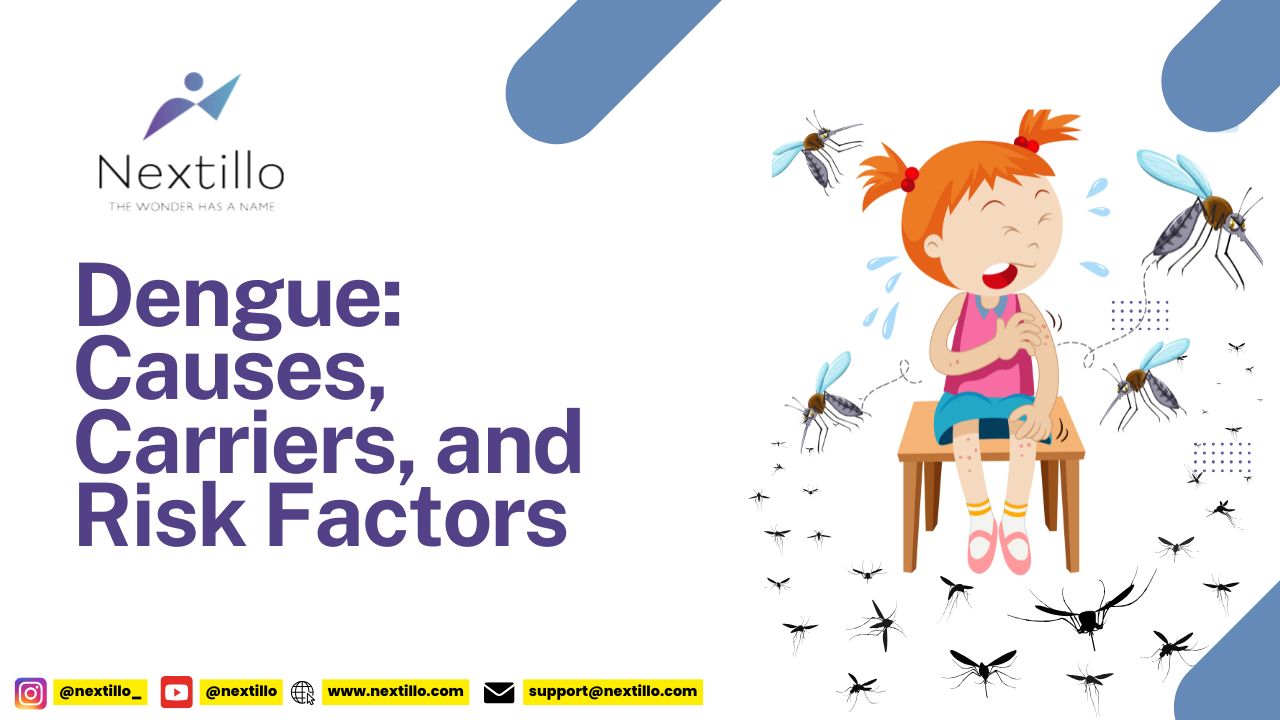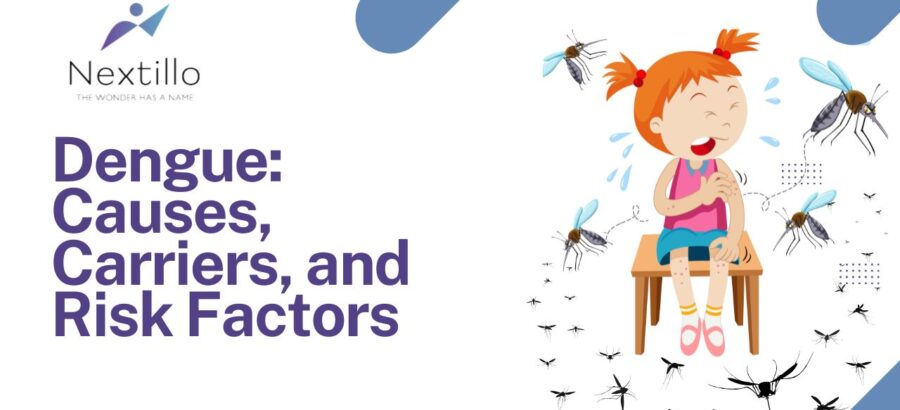Dengue is a global health issue that is growing tremendously with significant health and economic problems One of the major drawbacks we are facing is that there is no specific treatment, and the only thing we can do to prevent the deaths and complications related to dengue is early detection and to take preventive measures, which are important to reduce the risks and effects of disease.
Key facts!
- Dengue is a viral infection that is transmitted through the bites of infected mosquitoes from the Aedes species, but most commonly, Aedes aegypti spread dengue.
- There are 8.2 billion people around the world, and around half of the world’s population is at risk. According to the WHO, the total estimated number of infections this year is 14 million, and the total number of deaths is 10000, which has occurred globally.
- The dengue fever is mosquito-borne, and the virus is mainly found in densely populated areas.
- Dengue can cause severe illness, complications, and even death in some cases, and the major cause of death is dengue hemorrhagic fever.
- Prevention depends on vector control (mosquito prevention), as there is no specific treatment for dengue; only vector control measures and early detection and early access to medical care can reduce mortality in severe cases.
Now let’s discuss what are the leading causes and types of carriers in dengue!
- Dengue fever is caused mainly by any one of the total four viruses, which are DENV-1, DENV-2, DENV-3, and DENV-4. When an infected mosquito bites you the virus enters your bloodstream and starts to replicate. Both the virus and your body’s immune response lead to the symptoms of illness.
- The virus damages blood components that help in clotting and provide structure to blood vessels and certain chemicals produced by your immune system cause leakage of blood vessels that leads to internal bleeding. This can result in severe dengue, which is dangerous!
Now the question arises: how the dengue is transmitted and is it contagious?
Let’s discuss this with the image
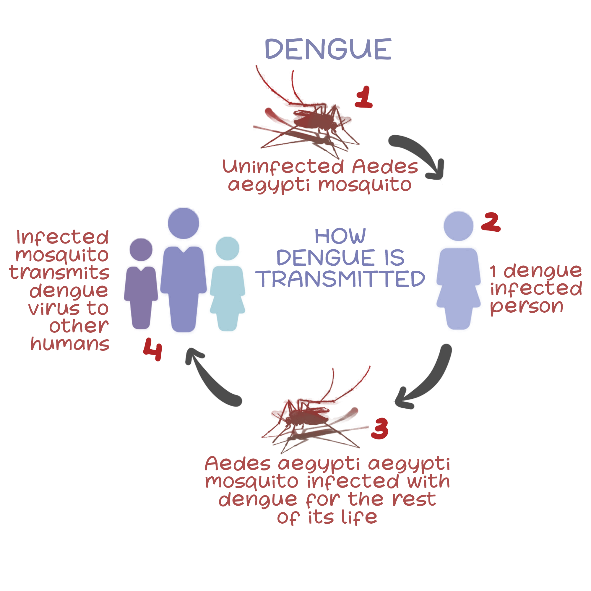
- So, when an uninfected mosquito bites a dengue-infected person, the Aedes aegypti mosquito gets infected with dengue for the rest of its life, and that infected mosquito transmits the dengue virus to other humans.
- While it is uncommon, pregnant women can transmit the dengue virus to their unborn child during pregnancy.
- Dengue fever is not contagious, which means it is not transmitted directly from person to person, like the flu or any other contagious disease. The only way it can be transmitted between individuals is if an infected mosquito bites the individual.
Types of carriers
Mosquitoes transmit dengue fever through the virus, and these viruses are predominantly located in tropical and subtropical regions, such as the Americas, Africa, the Middle East, Asia, and the Pacific Islands.
Symptoms
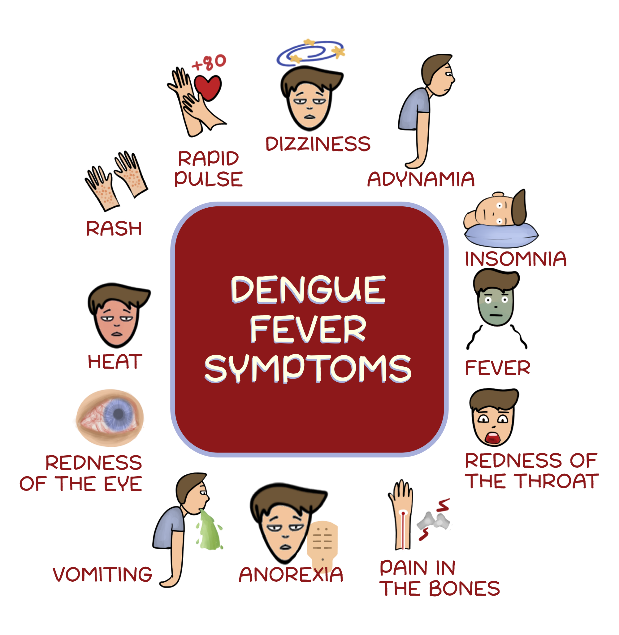
Dengue (breakbone fever) Most people have mild to moderate symptoms and will get better in 1-2 weeks, and in rare cases, it will lead to death.
Mild symptoms
- high fever (40°C/104°F)
- severe headache
- pain behind the eyes
- muscle and joint pains
- nausea
- vomiting
- swollen glands
- rash.
Severe dengue: Symptoms may become worse after the fever subsides and include:
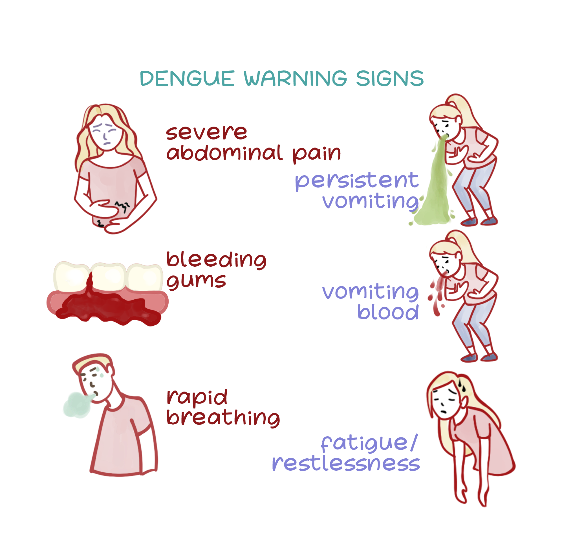
- Persistent vomiting
- Bleeding gums or nose
- Severe abdominal pain
- Fatigue and restlessness
- Pale or cold skin
- Rapid breathing
- Blood in vomit or stool
Risk Factors
- Previous infections of dengue can be a risk factor for developing a severe form of dengue if infected with a different strain.
- Practices and awareness for mosquito control and protection i.e. (using insect repellents and loose fitting clothes which covers the body and takes steps to control the mosquitoes in and around your home) play a crucial role in reducing the transmission
- Densely populated areas, improper waste management, and not proper storage practice of water in urban areas aid in mosquito breeding.
Prevention and Control
- Wear clothes that should cover the body.
- Use of mosquito nets and repellents, vaporizers, or mosquito coils
- Eliminate all forms of standing water sources (e.g., containers, old tires) and regularly clean water storage containers.
Diagnosis
- Here is the list of tests which can decrease the mortality rate of dengue haemorrhagic fever. Tests if done on time can prevent severe complications.
- Complete blood count (CBC): this test is routine and commonest among the following because it tells the platelet level which is very important to diagnose the chances of internal bleeding.
- NS1 antigen tests: used in early detection if fever is there.
- Dengue IgM antibody tests: They can identify dengue infections.
- Polymerase chain reaction (PCR): A type of NAAT that can detect viral genomes.
- Fibrinogen test.
Treatment
- Since there is no specific antiviral treatment for dengue, the primary approach is to manage the symptoms and provide pain relief, and to take the appropriate preventive measures to reduce the chances of complications.
- The basic treatment that doctors and practitioners practice is to give hydration, that is, to take an ample amount of fluids.
- Acetaminophen (also known as paracetamol) is commonly used to reduce pain and fever, and medications like Ibuprofen and aspirin (NSAIDS) are avoided because they can increase the risk of bleeding.
- In severe cases of dengue, hospitalization becomes necessary. In these situations, patients receive supportive care, including intravenous fluids and continuous monitoring to manage their condition effectively.
Vaccine
There are no antiviral treatments or licensed vaccines against dengue in India, but there is one dengue vaccine called Dengvaxia, made by Sanofi Pasteur, which will be available in the United States in 2022. It is a dengue tetravalent vaccine that prevents infection from four dengue viruses and lowers the risk of severe complications like dengue hemorrhagic fever or internal bleeding and hospitalization. But this dengue vaccine is not recommended for everybody; it is to be given only in prior infected individuals and the person who wants this vaccine should be investigated for prior infection first and then consider taking this vaccine.
